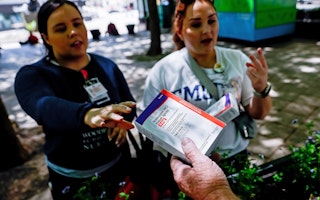This article, from the International Journal of Prisoner Health, documents the difficult decisions health care providers face as countries have increasingly turned to detention as a means for drug treatment over the past decade. Under this model, particularly prevalent in much of Asia, people suspected of using drugs are often rounded up on suspicion or a positive urine test, and imprisoned without due process or means of appeal. Inside, detainees frequently receive no effective drug treatment, little medical care, and insufficient food. Indeed, they are more likely to face what amounts to torture—cruel, inhuman, and degrading treatment. This includes, in certain countries, being forced to work or risking severe punishment.
Organizations that provide health care, food, or education within such institutions must fully consider whether their assistance is legitimizing an abusive system or even building its capacity to detain more people. In this paper, the authors supply the tools needed for practitioners to evaluate the ethical risks versus the humanitarian benefits of their aid.
Download
Read more
Harm Reduction for All
A Lifesaving Loan: A New Investment to Help Curb the U.S. Overdose Crisis

For over a decade, the small Remedy Alliance nonprofit has revolutionized providing lifesaving healthcare for people who use drugs. Our new investment will help the group increase access to the overdose antidote naloxone.
Drug Policy
Three Decades of Drug Policy Reform Work

Over the past 30 years, Open Society has been the largest philanthropic supporter of efforts to reform drug policy and promote harm reduction around the world. This is a timeline of the Foundations’ pathbreaking work.
WAR IS OVER?
How the United States Fueled a Global Drug War, and Why It Must End

As U.S. domestic drug policy reform gains momentum, it is time the United States makes a concerted effort to de-escalate the failed war on drugs elsewhere.
